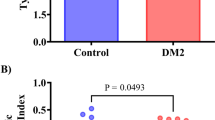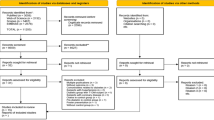Abstract
Several studies suggest that the response to various stressors differs between the sexes. We aimed to study serum HSP70 and levels of oxidized-LDL (ox-LDL) as markers of oxidative stress in men and women with type 2 diabetes. We quantified serum HSP70 and levels of ox-LDL in three cohorts; patients with newly diagnosed diabetes, patients with long-standing diabetes and normal controls. The cohort of patients with newly diagnosed diabetes was followed up for 3 months under glucose-lowering therapy with metformin. Our findings showed that serum HSP70 level was increased in women with long-standing diabetes in comparison with men. HSP70 did not decrease after glucose lowering therapy in women with newly diagnosed diabetes, but it did decrease in men. There was no significant difference on ox-LDL between men and women in any of the studied cohorts. It decreased significantly in the cohort of patients with newly diagnosed diabetes after treatment, regardless of sex. There was no significant correlation between HSP70 and ox-LDL in any of the studied cohorts except among normal women. We suggest that diabetes induces an immune response and impairs cellular defense mechanisms against oxidative stress more commonly in women with type 2 diabetes than in men.


Similar content being viewed by others
References
Albert MA, Ridker PM (2006) C-reactive protein as a risk predictor: do race/ethnicity and gender make a difference? Circulation 114(5):e67–e74
Asea A (2008) Hsp70: a chaperokine. Novartis Found Symp 291:173–179, discussion 179–183, 221–274
Atalay M, Oksala N, Lappalainen J, Laaksonen DE, Sen CK, Roy S (2009) Heat shock proteins in diabetes and wound healing. Curr Protein Pept Sci 10(1):85–95
Brownlee M (2005) The pathobiology of diabetic complications: a unifying mechanism. Diabetes 54(6):1615–1625
De Leon-Nava MA, Morales-Montor J (2006) Immune sexual dimorphism: can sex steroids affect the th1/th2 cytokine profile? Rev Invest Clin 58(2):161–169
Diagnosis and classification of diabetes mellitus (2009) Diabetes Care 32 Suppl 1(1):S62–S67
Donahoe SM, Stewart GC, McCabe CH, Mohanavelu S, Murphy SA, Cannon CP, Antman EM (2007) Diabetes and mortality following acute coronary syndromes. JAMA 298(7):765–775
Gebhardt BR, Ries J, Caspary WF, Boehles H, Stein J (1999) Superoxide: a major factor for stress protein induction in reoxygenation injury in the intestinal cell line caco-2. Digestion 60(3):238–245
Grimaldi CM (2006) Sex and systemic lupus erythematosus: the role of the sex hormones estrogen and prolactin on the regulation of autoreactive b cells. Curr Opin Rheumatol 18(5):456–461
Gu K, Cowie CC, Harris MI (1999) Diabetes and decline in heart disease mortality in us adults. JAMA 281(14):1291–1297
Hageman J, Kampinga HH (2009) Computational analysis of the human hsph/hspa/dnaj family and cloning of a human hsph/hspa/dnaj expression library. Cell Stress Chaperones 14(1):1–21, Epub 2008 Aug 2007
Ireland HE, Leoni F, Altaie O, Birch CS, Coleman RC, Hunter-Lavin C, Williams JH (2007) Measuring the secretion of heat shock proteins from cells. Methods 43(3):176–183
Jankord R, Turk JR, Schadt JC, Casati J, Ganjam VK, Price EM, Keisler DH, Laughlin MH (2007) Sex difference in link between interleukin-6 and stress. Endocrinology 148(8):3758–3764
Kamper EF, Chatzigeorgiou A, Tsimpoukidi O, Kamper M, Dalla C, Pitychoutis PM, Papadopoulou-Daifoti Z (2009) Sex differences in oxidant/antioxidant balance under a chronic mild stress regime. Physiol Behav 98(1–2):215–222
Kampinga HH, Hageman J, Vos MJ, Kubota H, Tanguay RM, Bruford EA, Cheetham ME, Chen B, Hightower LE (2009) Guidelines for the nomenclature of the human heat shock proteins. Cell Stress Chaperones 14(1):105–111, Epub 2008 Jul 2029
Kragelund C, Kober L, Faber J, Steffensen R, Hildebrandt P (2007) Metabolic syndrome and mortality in stable coronary heart disease: relation to gender. Int J Cardiol 121(1):62–67
Legato MJ, Gelzer A, Goland R, Ebner SA, Rajan S, Villagra V, Kosowski M (2006) Gender-specific care of the patient with diabetes: review and recommendations. Gend Med 3(2):131–158
Mayer MP, Bukau B (2005) Hsp70 chaperones: cellular functions and molecular mechanism. Cell Mol Life Sci 62(6):670–684
Molvarec A, Prohaszka Z, Nagy B, Szalay J, Fust G, Karadi I, Rigo J Jr (2006) Association of elevated serum heat-shock protein 70 concentration with transient hypertension of pregnancy, preeclampsia and superimposed preeclampsia: a case-control study. J Hum Hypertens 20(10):780–786, Epub 2006 Jun 2008
Molvarec A, Prohaszka Z, Nagy B, Kalabay L, Szalay J, Fust G, Karadi I, Rigo J Jr (2007a) Association of increased serum heat shock protein 70 and c-reactive protein concentrations and decreased serum alpha(2)-hs glycoprotein concentration with the syndrome of hemolysis, elevated liver enzymes, and low platelet count. J Reprod Immunol 73(2):172–179, Epub 2006 Oct 2004
Molvarec A, Rigo J Jr, Nagy B, Walentin S, Szalay J, Fust G, Karadi I, Prohaszka Z (2007b) Serum heat shock protein 70 levels are decreased in normal human pregnancy. J Reprod Immunol 74(1–2):163–169
Molvarec A, Derzsy Z, Kocsis J, Boze T, Nagy B, Balogh K, Mako V, Cervenak L, Mezes M, Karadi I, Prohaszka Z, Rigo J Jr (2009a) Circulating anti-heat-shock-protein antibodies in normal pregnancy and preeclampsia. Cell Stress Chaperones 14(5):491–498, Epub 2009 Feb 2011
Molvarec A, Rigo J Jr, Lazar L, Balogh K, Mako V, Cervenak L, Mezes M, Prohaszka Z (2009b) Increased serum heat-shock protein 70 levels reflect systemic inflammation, oxidative stress and hepatocellular injury in preeclampsia. Cell Stress Chaperones 14(2):151–159
Molvarec A, Tamasi L, Losonczy G, Madach K, Prohaszka Z, Rigo J Jr (2010) Circulating heat shock protein 70 (hspa1a) in normal and pathological pregnancies. Cell Stress Chaperones 15(3):237–247
Nakhjavani M, Morteza A, Khajeali L, Esteghamati A, Khalilzadeh O, Asgarani F, Outeiro TF (2010) Increased serum hsp70 levels are associated with the duration of diabetes. Cell Stress Chaperones. doi:10,1007/s12192-010-0204-z
Njemini R, Demanet C, Mets T (2004) Inflammatory status as an important determinant of heat shock protein 70 serum concentrations during aging. Biogerontology 5(1):31–38
Oglesbee MJ, Herdman AV, Passmore GG, Hoffman WH (2005) Diabetic ketoacidosis increases extracellular levels of the major inducible 70-kda heat shock protein. Clin Biochem 38(10):900–904
Pandey KB, Mishra N, Rizvi SI (2009) Protein oxidation biomarkers in plasma of type 2 diabetic patients. Clin Biochem 23:23
Payette C, Blackburn P, Lamarche B, Tremblay A, Bergeron J, Lemieux I, Despres JP, Couillard C (2009) Sex differences in postprandial plasma tumor necrosis factor-alpha, interleukin-6, and C-reactive protein concentrations. Metabolism 58(11):1593–1601
Perez-Torres I, Roque P, El Hafidi M, Diaz-Diaz E, Banos G (2009) Association of renal damage and oxidative stress in a rat model of metabolic syndrome. Influence of gender. Free Radic Res 43(8):761–771
Piarulli F, Lapolla A, Sartore G, Rossetti C, Bax G, Noale M, Minicuci N, Fiore C, Marchioro L, Manzato E, Fedele D (2005) Autoantibodies against oxidized ldls and atherosclerosis in type 2 diabetes. Diab Care 28(3):653–657
Pockley AG, De Faire U, Kiessling R, Lemne C, Thulin T, Frostegard J (2002) Circulating heat shock protein and heat shock protein antibody levels in established hypertension. J Hypertens 20(9):1815–1820
Pockley AG, Georgiades A, Thulin T, de Faire U, Frostegard J (2003) Serum heat shock protein 70 levels predict the development of atherosclerosis in subjects with established hypertension. Hypertension 42(3):235–238
Renie G, Maingrette F, Li L (2007) Diabetic vasculopathy and the lectin-like oxidized low-density lipoprotein receptor-1 (lox-1). Curr Diabetes Rev 3(2):103–110
Soti C, Nagy E, Giricz Z, Vigh L, Csermely P, Ferdinandy P (2005) Heat shock proteins as emerging therapeutic targets. Br J Pharmacol 146(6):769–780
Steinberg D (1997) Low density lipoprotein oxidation and its pathobiological significance. J Biol Chem 272(34):20963–20966
Svensson PA, Asea A, Englund MC, Bausero MA, Jernas M, Wiklund O, Ohlsson BG, Carlsson LM, Carlsson B (2006) Major role of hsp70 as a paracrine inducer of cytokine production in human oxidized LDL treated macrophages. Atherosclerosis 185(1):32–38
Tamasi L, Bohacs A, Tamasi V, Stenczer B, Prohaszka Z, Rigo J Jr, Losonczy G, Molvarec A (2009) Increased circulating heat shock protein 70 levels in pregnant asthmatics. Cell Stress Chaperones 15(3):295–300
Veiraiah A (2005) Hyperglycemia, lipoprotein glycation, and vascular disease. Angiology 56(4):431–438
Wang YR, Xiao XZ, Huang SN, Luo FJ, You JL, Luo H, Luo ZY (1996) Heat shock pretreatment prevents hydrogen peroxide injury of pulmonary endothelial cells and macrophages in culture. Shock 6(2):134–141
Wei W, Liu Q, Tan Y, Liu L, Li X, Cai L (2009) Oxidative stress, diabetes, and diabetic complications. Hemoglobin 33(5):370–377
White RE, Gerrity R, Barman SA, Han G (2010) Estrogen and oxidative stress: a novel mechanism that may increase the risk for cardiovascular disease in women. Steroids Epub ahead of print
Woodman RJ, Watts GF, Playford DA, Best JD, Chan DC (2005) Oxidized LDL and small LDL particle size are independently predictive of a selective defect in microcirculatory endothelial function in type 2 diabetes. Diabetes Obes Metab 7(5):612–617
Wright E Jr, Scism-Bacon JL, Glass LC (2006) Oxidative stress in type 2 diabetes: the role of fasting and postprandial glycaemia. Int J Clin Pract 60(3):308–314
Author information
Authors and Affiliations
Corresponding author
Rights and permissions
About this article
Cite this article
Nakhjavani, M., Morteza, A., Meysamie, A. et al. Serum heat shock protein 70 and oxidized LDL in patients with type 2 diabetes: does sex matter?. Cell Stress and Chaperones 16, 195–201 (2011). https://doi.org/10.1007/s12192-010-0232-8
Received:
Revised:
Accepted:
Published:
Issue Date:
DOI: https://doi.org/10.1007/s12192-010-0232-8




